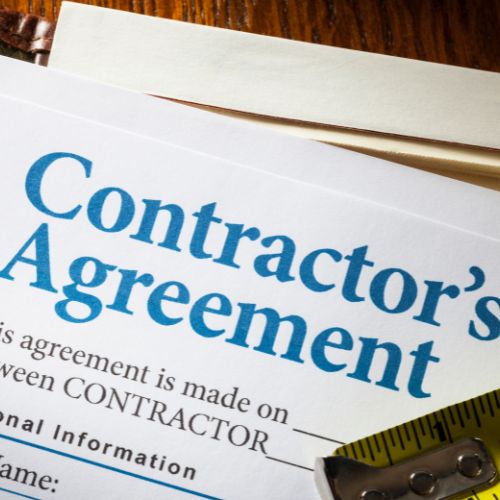Finding a contractor you trust can present an overwhelming task in these times when good contractors are stretched thin and hard to find. You are absolutely not alone and. Competent contractors are out there – below are some ideas to keep your project on track.
Where Can You Find a Good Contractor?
Ask your friends and neighbors for referrals. Need a painter for a big job? Check at a reputable paint store for business cards of painters who work in your area. Go to home improvement shows, watch for vehicles of contractors already working in your area and snap a picture. If you can, ask those contractors for references. Other options are big box store contractors, local classified ads and neighborhood social media.
Read reviews online before contacting anyone: a minimal online presence can sometimes be a red flag. Be wary of big online aggregators of local contractors. These services do not review contractor credentials, and often charge contractors huge sums for listings and leads – even if they do not result in a job. These sites release your contact information to multiple sales reps who hound you by phone, text and email.
Success with Contractor Agreements Can be Up to You
Define your scope of work for your project, then set your budget based on actual estimates for your area. Most big box stores can give you an estimate range for your project. If you create a budget that is too low, you might only find the wrong kind of contractor. Bathroom and kitchen remodels cost a lot more than they did 20 years ago.
Commit to the time and energy needed to schedule and review three solid bids. This process can take weeks, so be prepared to accept the winning bid when you find an affordable and competent contractor. Remember to allocate time to review your contractor’s reputation and business practices.
Hiring a Contractor in California Checklist:
There are lots of protections for consumers who do their research and stay on top of their projects.
♦ California contractors are required to be licensed, and display their license number on business cards, flyers and business vehicles. If you don’t see a contractor license number check the online search page at the CA.gov Department of Consumer Affairs Contractors State License Board here. Use the full contractor name, including the middle name of sole owners. Compare the name to the phone number listed. Note: Home improvement salespeople are also required to be licensed.
♦ Check the contractor’s credentials carefully. The License Detail should confirm the license is current, and list the contractor classification type. Note the contractor’s Bond number, bond amount and current status
♦ If your project involves asbestos or lead paint, verify your contractor is current with required certifications.
♦ Check for prior work-related civil judgments against the contractor. Be aware complaints are not always up-to-date on the website – it’s OK to ask your contractor directly for details of recent complaints.
♦ In most cases avoid paying more than 10% down, or more than $1,000 as a down payment. Never pay contractor’s invoices in cash, and keep your contract, payment records and all other paperwork together in a safe place. Avoid making a final payment until the work is complete, and your remodeling project has passed all required inspections from the city.
♦ Is your contractor insured? Double check. Do they pay workers’ compensation for their employees? What about subcontractors? Are all workers on the job licensed and insured?
♦ Note the warranty on every contract you sign. Do not sign the contract’s form if it makes you agree to arbitration of any disputes. You want to be able to file a lawsuit and present evidence of the contractor’s wrongdoing to a jury. You will not be able to do any of these things in arbitration.
When to Sue Your Contractor
Defects caused by contractors can lead to serious problems. Faulty construction and defective products can cause injury to you or seriously damage your home and decrease its value. The California Law for construction defect lawsuits is complex..It is easy to overlook key details you must know to prevail in a construction lawsuits. There are different statutes of limitations for filing various types of construction lawsuits. Breach of contract, construction delays and code violations may be interpreted differently by the involved parties and require legal expertise.
Your chances of winning money damages for the contractor’s failure to correctly remodel your home are far greater with a licensed, experienced contractor than they are with an unlicensed operator who disappears with your down payment. restitution are far greater with a licensed, experienced contractor than they are with an unlicensed operator who disappeared with your down payment.
If you need to sue your contractor for a remodeling project gone wrong, you’ll want an experienced real estate attorney in your corner.
Know Your Rights. Protect Yourself


 (415) 533-0735
(415) 533-0735 (415) 843-0496
(415) 843-0496